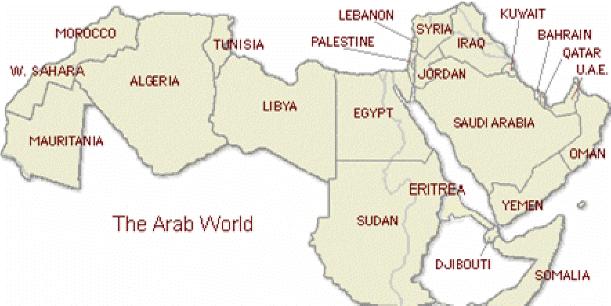DSM IV
309.81
Quote:
Posttraumatic Stress Disorder
A. The person
If we do not understand why something is wrong, we cannot make it right.
Monday, February 28, 2011
Thursday, February 24, 2011
Current Events: Pan-Arab Unrest
The Muslim World vs. The Arab World
We have been watching some of the events in North Africa and the Near and Middle East. It is important to know what area we are discussing.
First we will look at the Muslim world.
The unrest/protests are spreading across the Arab world and into places like Iraq, Greece, and Pakistan.
This woman is holding a sign to show what she hopes is happening.
Mubarak chose to step down in the face of the wishes of the Egyptian people.
Other leaders may choose different paths, like Gaddafi of Libya who has said that he will fight until he "dies like a martyr" and has vowed to crush the growing revolt.
Jordan
Libya
Yemen
Bahrain
Iraq
Syria
Tunisia
Morocco
Greece
For homework, read the articles in the handout and look in the newspapers and online for more information. Plot on the map where there is political unrest and mark why the people are unhappy. This map is due on Friday, March 4th.
Tuesday, February 15, 2011
Homophobia Around the World
I found this article on the blog LLWorldTour
Homophobia around the world, Alive and Well?
Around the world, tolerance and diversity have been taking a beating.Recently Uganda threatened to jail anyone taking part in homosexual activity – in other words, if you’re gay, you’ll go to jail, possibly for life, this despite an outcry around the world. Malawi’s police are actively hunting down people they think might be gay, and Zimbabwe’s President Mugabe once called homosexuality ‘un-African’. Across Europe, spikes of discrimination are casting a shadow over the continent’s once exemplary tolerance. Worldwide, hate groups are becoming more active, in person and online.
But the voice of reason may prevail. Everywhere people are speaking out. People who are gay, of course, but also people who are not.
- South Africa’s constitution prohibits discrimination on the basis of sexual orientation, the first one to do so.
- Archbishop Desmond Tutu, winner of the Nobel Peace Prize, has spoken firmly against homophobia.
- In Canada, Spain, Belgium and several other countries, same-sex couples have the same rights as everyone else to marry.
- The UK, Sweden and Norway have made development assistance conditional on supporting human rights, threatening to withhold it – from Uganda and elsewhere – in the face of discrimination against homosexuals.
- Across conservative Africa, human rights groups are making themselves heard, as is the continent’s largest trade union, COSATU.
- In Scotland, educational authorities have decided that every high school will receive a powerful anti-homophobia DVD.
- In the European Parliament, politicians are pushing back discriminatory laws.
- Daniel Radcliffe, better known for his role as Harry Potter, has spoken out publicly and is taking action.
- In the US, the ‘don’t ask, don’t tell’ policy in the armed forces is being watered down, and television stars are taking part in public service announcements against homophobia.
- Just 24 hours after Britain made history by holding Parliament’s first same-sex marriage in late March 2010, the Household Cavalry – one of the oldest and most distinguished regiments in the British Army – celebrated its first gay wedding.
Tuesday, February 1, 2011
Rights of Women - Focus on Afghanistan
This very shocking picture of a young Afghan woman with her nose cut off appeared on the cover of Time Magazine on Thursday, July 29, 2010. The message of the picture and the headline is clear.
Read the article and the NY Times response posted below.
Taliban vs. Muslim
What happened to Aisha at the hands of the Taliban is terrible, however, it is important to understand the difference between Taliban beliefs and Muslim beliefs. The abuses that we hear about that women face in Afghanistan and in some other Muslim countries are not according to Muslim law.
Think of Christianity. There is a wide range of religions under the blanket term "Christianity": Catholic, Protestant, and Orthodox. And under these headings there are even more divisions. The range of beliefs and practices amongst Christians - from United Church to Southern Baptist to Roman Catholic to Fundamentalist Mormon - are very wide.
Look at the wide range of attitudes by these famous Christians:
Archbishop Desmond Tutu
“If you are neutral in situations of injustice, you have chosen the side of the oppressor. If an elephant has its foot on the tail of a mouse and you say that you are neutral, the mouse will not appreciate your neutrality.”
“If you are neutral in situations of injustice, you have chosen the side of the oppressor. If an elephant has its foot on the tail of a mouse and you say that you are neutral, the mouse will not appreciate your neutrality.”
Rowan Williams, Archbiship of Canterbury
“I am certainly not ascribing to the defenders of euthanasia or assisted dying any motive but the desire to spare people unnecessary suffering,”
“I am certainly not ascribing to the defenders of euthanasia or assisted dying any motive but the desire to spare people unnecessary suffering,”
Jerry Falwell
"Homosexuals are brute beasts…part of a vile and satanic system that will be utterly annihilated, and there will be a celebration in heaven."
"Homosexuals are brute beasts…part of a vile and satanic system that will be utterly annihilated, and there will be a celebration in heaven."
Bono - "To be one, to be united is a great thing. But to respect the right to be different is maybe even greater."
Pat Robertson - (About Venezuelan President, Hugo Chavez)
"...if he (Chavez) thinks we're trying to assassinate him, I think that we really ought to go ahead and do it."
"...if he (Chavez) thinks we're trying to assassinate him, I think that we really ought to go ahead and do it."
Mother Teresa
"If we really want to love we must learn how to forgive."
"If we really want to love we must learn how to forgive."
Just as there are a wide range of Christian groups, there are also a wide range of Islamic groups: Shia, Sunni, Kharijite, Sufi, Ahmadiyya, and others. And as with Christian groups, amongst Muslims there is a wide range of attitudes.
Shirin Ebadi (First Iranian and first Muslim woman to win the Nobel Peace Prize)
“We must not enable anyone to impose his personal view regarding religion on others by force, oppression, or pressure.”
“We must not enable anyone to impose his personal view regarding religion on others by force, oppression, or pressure.”
Sheikh Haron (Muslim cleric, peace activist and lawyer speaking to the Australian prime minister about Australia's role in Afghanistan)
"I have a question, did your stomach turn when you heard the news that the Australian army has killed innocent civilians."
"I have a question, did your stomach turn when you heard the news that the Australian army has killed innocent civilians."
Osama Bin Laden
“Every Muslim, the minute he can start differentiating, carries hate towards Americans, Jews, and Christians; this is part of our ideology. Ever since I can recall I felt at war with the Americans and had feelings of animosity and hate toward them.”
“Every Muslim, the minute he can start differentiating, carries hate towards Americans, Jews, and Christians; this is part of our ideology. Ever since I can recall I felt at war with the Americans and had feelings of animosity and hate toward them.”
Shaykh Waleed Basyouni (scholar)
"The Muslim ummah (an Arabic word meaning "community" or "nation") cannot take another war. Let’s unite on our common grounds rather than focus on our differences. Let us focus on what we agree upon and negotiate/discuss matters based upon them. You will find that most of these differences will begin to melt away."
"The Muslim ummah (an Arabic word meaning "community" or "nation") cannot take another war. Let’s unite on our common grounds rather than focus on our differences. Let us focus on what we agree upon and negotiate/discuss matters based upon them. You will find that most of these differences will begin to melt away."
Hassan Al-Banna (schoolteacher and imam)
"The supreme martyrdom is only conferred on those who slay or are slain in the way of God. As death is inevitable and can happen only once, partaking in jihad is profitable in this world and the next."
"The supreme martyrdom is only conferred on those who slay or are slain in the way of God. As death is inevitable and can happen only once, partaking in jihad is profitable in this world and the next."
Dayiee Abdullah (only openly gay imam)
“To be gay and Muslim, at times, people will say that it is an oxymoron. But in actuality, it’s a formulation that shows the diversity within Islam; that people can be a variety of backgrounds. The Quran says to look to the nature of the world. And from that, you can see the diversity and understand that Allah’s understanding of the world and the universe in which he created is full of diversity; but you find the oneness, the tauheed unification of all, through those various diverse aspects.”
“To be gay and Muslim, at times, people will say that it is an oxymoron. But in actuality, it’s a formulation that shows the diversity within Islam; that people can be a variety of backgrounds. The Quran says to look to the nature of the world. And from that, you can see the diversity and understand that Allah’s understanding of the world and the universe in which he created is full of diversity; but you find the oneness, the tauheed unification of all, through those various diverse aspects.”
Muslim Law, or Sharia:
The following description of Sharia comes from The Council on Foreign Relations at http://www.cfr.org/religion/islam-governing-under-sharia/p8034
What is Sharia?
Also meaning "path" in Arabic, sharia guides all aspects of Muslim life including daily routines, familial and religious obligations, and financial dealings. It is derived primarily from the Quran and the Sunna--the sayings, practices, and teachings of the Prophet Mohammed. Precedents and analogy applied by Muslim scholars are used to address new issues. The consensus of the Muslim community also plays a role in defining this theological manual.
Controversy: Punishment and Equality under Sharia
Marriage and divorce are the most significant aspects of sharia, but criminal law is the most controversial. In sharia, there are categories of offenses: those that are prescribed a specific punishment in the Quran, known as hadd punishments, those that fall under a judge's discretion, and those resolved through a tit-for-tat measure (ie., blood money paid to the family of a murder victim). There are five hadd (bounds of acceptable behaviour) crimes: unlawful sexual intercourse (sex outside of marriage and adultery), false accusation of unlawful sexual intercourse, wine drinking (sometimes extended to include all alcohol drinking), theft, and highway robbery. Punishments for hadd offenses--flogging, stoning, amputation, exile, or execution--get a significant amount of media attention when they occur. These sentences are not often prescribed, however. "In reality, most Muslim countries do not use traditional classical Islamic punishments," says Ali Mazrui of the Institute of Global Cultural Studies in a Voice of America interview. These punishments remain on the books in some countries but lesser penalties are often considered sufficient.
Despite official reluctance to use hadd punishments, vigilante justice still takes place. Honor killings, murders committed in retaliation for bringing dishonor on one's family, are a worldwide problem. While precise statistics are scarce, the UN estimates thousands of women are killed annually in the name of family honor (National Geographic). Other practices that are woven into the sharia debate, such as female genital mutilation, adolescent marriages, polygamy, and gender-biased inheritance rules, elicit as much controversy. There is significant debate over what the Quran sanctions and what practices were pulled from local customs and predate Islam. Those that seek to eliminate or at least modify these controversial practices cite the religious tenet of tajdid. The concept is one of renewal, where Islamic society must be reformed constantly to keep it in its purest form. "With the passage of time and changing circumstances since traditional classical jurisprudence was founded, people's problems have changed and conversely, there must be new thought to address these changes and events," says Dr. Abdul Fatah Idris, head of the comparative jurisprudence department at Al-Azhar University in Cairo. Though many scholars share this line of thought, there are those who consider the purest form of Islam to be the one practiced in the seventh century.
It is important to look at certain practices in Islamic countries/regions in the context of the entrenched customs and cultural practices that occur there.
This cross-over between culture and religion is not unique to Islamic countries and regions. For example, there are still older people in villages in Sicily who believe in "malocchio" or the evil eye.
There are many Muslims all over the world that are horrified by the Taliban interpretation of Sharia - just as horrified as people of other faiths.
A good website to look at to see the treatment of women in Afghanistan is the Revolutionary Association of Women of Afghanistan (RAWA).
For homework, look through the website and write a response to this in your journal, keeping in mind what you have learned about Islam today.
Subscribe to:
Posts (Atom)



























